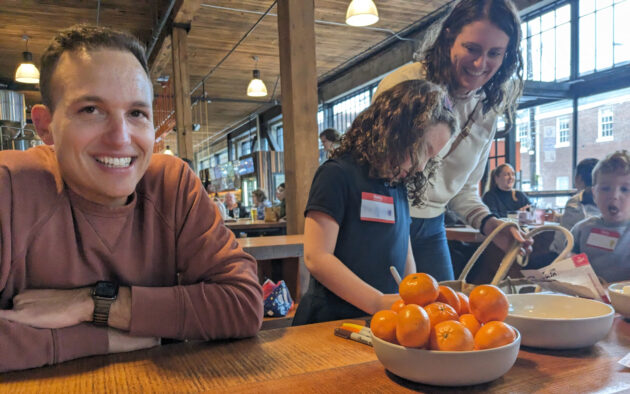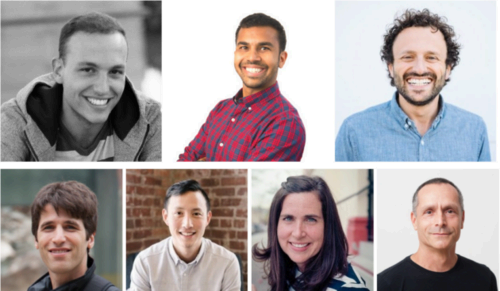
The climate clock is ticking for Ben Eidelson.
The Seattle tech vet who sold startups to Google and Stripe is behind a new climate venture capital fund focused on software-driven solutions for accelerating the deployment of carbon cutting technologies.
Stepchange has already invested in four startups and is on track to close a $3 million inaugural fund. The fund is backing pre-seed and seed companies and issuing checks of $100,000-to-$200,000.
The plan is to distribute the dollars to 20 or more startups within a year-to-18 months — a relatively fast time frame in the venture capital world.
“We want to help companies and capture the opportunity of now,” Eidelson said. The rapid pace of investing will allow the fund to quickly see how the bets play out, he said, and learn what the successful founders need next.
“I’m impatient,” Eidelson said.
In recent years, the father of two kept growing increasingly anxious about the climate crisis, compelling him to quit his job at Stripe in 2022 and turn his attention to addressing the planetary threat.
Along with his brother, Eidelson published a step-by-step guide encouraging other software engineers to pursue climate jobs that need their skills. He began angel investing and advising climate tech startups. In June, he launched the Climate Papa podcast in which he talks about climate issues with guests who are experts in the space and often also parents themselves.
The podcast released an episode today featuring the new venture capital fund.
It’s through Stepchange that Eidelson expects to have his greatest impact, offering both financial support and sharing his own founder experience and software product expertise with climate startups.
The timing is likely welcome by climate startups. As with the rest of the startup economy, the climate sector saw a decline in venture capital investments in 2023.
Funding worldwide for climate tech totaled $32 billion last year, a drop of 30% from the previous year, according to a new report from Sightline Climate, a market analysis platform. The total number of deals slid 3%. Seed rounds were the only stage of climate tech investing that didn’t decline, with a 7% increase in seed funding to $2.2 billion, Sightline Climate found.
“2024 is looking to be a critical year as climate tech continues its journey from the lab to large scale deployment,” the analysts said.

Despite last year’s dimmed enthusiasm for climate tech, Stepchange has attracted a notable cohort of investment partners and advisors.
Stepchange has two venture partners:
- Arthur Shwab, lead of design and engineering teams at Bilberrry and Eidelson’s brother-in-law
- Anay Shah, an early employee of Seattle-based Remitly, a digital payments company serving immigrants, and most recently senior vice president for Global Business at fintech company Tala
The fund has more than 30 limited partners. From the investment community they include Bain Capital; Anish Acharya, a general partner at Andreessen Horowitz; and David Lieb, a visiting group partner at Y Combinator. There are numerous LPs from tech companies and many from the Seattle tech ecosystem, including Jeremy Hofmann, Zillow’s chief financial officer; George Perantatos, Redfin’s director of product; and Ehud Halberstam, CEO and co-founder of Chordio.
Four LPs are also advisors: Ian Wong, co-founder of Opendoor; Stephanie Hannon, who worked on products such as Gmail, Google Maps, Google Wave and Strava; Ari Steinberg, former head of the Airbnb Seattle office; and Bradley Horowitz, former vice president and advisor at Google.
Julie Sandler, a managing director at Pioneer Square Labs and co-founding general partner of PSL’s venture capital firm, praised Eidelson’s efforts in today’s episode of Climate Papa.
“I am so excited and grateful for the birth of Stepchange,” Sandler said, adding that this was the best possible moment for the fund to launch “given all the opportunity at this moment of inflection across different domains that touch things in climate tech.”
Stepchange is eager to speed the deployment of a range of low carbon technologies, such as electric vehicles and bikes, heat pumps in homes and businesses, and community solar. It’s also interested in expanding the climate tech installation workforce and creating tools to help government agencies working in sustainability.
Its first four publicly announced investments are:
- Bayou Energy, a Seattle company accessing customer utility data to support clean energy installations
- Itselectric, a New York startup developing technology for installing public curbside EV chargers on private property
- Rhizome, a Washington, D.C., company working with electric utilities to boost grid resiliency using artificial intelligence
- Line.Build, a startup with Seattle-area connections building software to connect contractors with decarbonization incentives
Eidelson emphasizes that while Stepchange is driven by what he sees as a moral imperative — working as fast and aggressively as possible to slash carbon from every sector of the economy — he also expects it to succeed financially.
“This is the largest economic transition we’ve had as a species,” he said. “The largest companies making solar [technologies], batteries, Tesla — these are not charities. These are the next Apple.”

